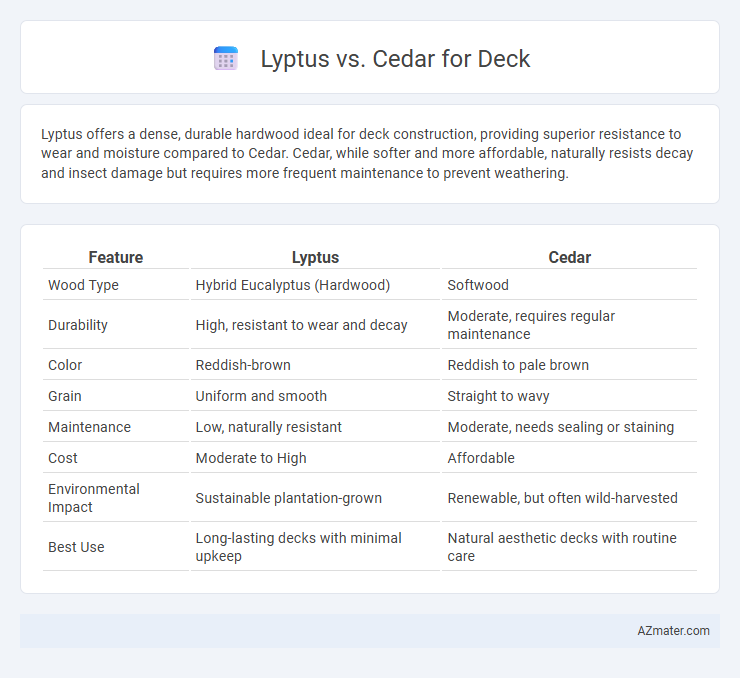Lyptus offers a dense, durable hardwood ideal for deck construction, providing superior resistance to wear and moisture compared to Cedar. Cedar, while softer and more affordable, naturally resists decay and insect damage but requires more frequent maintenance to prevent weathering.
Table of Comparison
| Feature | Lyptus | Cedar |
|---|---|---|
| Wood Type | Hybrid Eucalyptus (Hardwood) | Softwood |
| Durability | High, resistant to wear and decay | Moderate, requires regular maintenance |
| Color | Reddish-brown | Reddish to pale brown |
| Grain | Uniform and smooth | Straight to wavy |
| Maintenance | Low, naturally resistant | Moderate, needs sealing or staining |
| Cost | Moderate to High | Affordable |
| Environmental Impact | Sustainable plantation-grown | Renewable, but often wild-harvested |
| Best Use | Long-lasting decks with minimal upkeep | Natural aesthetic decks with routine care |
Introduction to Lyptus and Cedar Decking
Lyptus decking features a durable, dense hardwood made from a hybrid of Eucalyptus species, known for its rich reddish-brown color and natural resistance to decay and insects. Cedar decking offers a softer, lightweight wood with a distinct aromatic scent and natural oils that help resist moisture, decay, and insect damage. Both Lyptus and Cedar provide attractive, sustainable options for decking, with Lyptus excelling in hardness and longevity, while Cedar is prized for its aesthetic appeal and ease of use.
Origin and Sustainability of Lyptus vs Cedar
Lyptus wood is sourced from fast-growing Eucalyptus trees cultivated on sustainable plantations in Brazil, designed to minimize environmental impact through responsible forestry management practices. In contrast, cedar, commonly harvested from Western Red Cedar trees native to the Pacific Northwest of North America, is valued for its natural resistance to decay and pests, though its sustainability depends on sourcing from well-managed forests certified by organizations like FSC. Lyptus offers a renewable alternative with rapid growth cycles and less pressure on old-growth forests, whereas cedar's sustainability hinges on responsible harvesting to maintain ecological balance.
Appearance and Aesthetic Differences
Lyptus wood features a consistent, reddish-brown hue with subtle grain patterns, offering a smooth and modern look for decks. Cedar displays a warm, rich palette ranging from light amber to deep reddish-brown, often showcasing prominent knots and grain variations that contribute to a rustic, natural aesthetic. The choice between Lyptus and Cedar hinges on whether a sleek, uniform appearance or a more traditional, textured visual appeal is desired.
Durability and Weather Resistance
Lyptus wood offers exceptional durability and high resistance to weather, making it ideal for outdoor decking exposed to varying climates. Cedar is naturally resistant to rot, decay, and insect damage, providing reliable longevity but requires more regular maintenance to sustain its weather resistance. Both woods perform well in deck applications, with Lyptus generally delivering better hardness and wear resistance, while cedar excels in natural moisture and pest defense.
Maintenance Requirements
Lyptus wood requires minimal maintenance due to its dense grain and natural resistance to moisture, rot, and insect damage, making it ideal for outdoor decks. Cedar decks demand regular upkeep including annual sealing or staining to protect against weathering, along with periodic cleaning to prevent mold and mildew growth. Choosing Lyptus reduces long-term maintenance efforts and costs compared to cedar, which requires more frequent treatments to maintain its durability and appearance.
Cost Comparison: Lyptus vs Cedar
Lyptus decking generally costs more upfront than cedar, with prices ranging from $7 to $12 per square foot compared to cedar's $5 to $8 per square foot. The higher initial investment in Lyptus is often offset by its superior durability and resistance to rot, potentially reducing maintenance and replacement costs over time. Cedar may require more frequent sealing and repairs, increasing its long-term expense despite the lower starting price.
Workability and Installation
Lyptus offers a smooth, consistent grain with excellent workability, allowing for easier cutting, sanding, and fastening compared to traditional hardwoods. Cedar, known for its lightweight and softer texture, is also easy to install and shapes well but may require more careful handling to avoid dents and scratches. Both woods provide good installation experiences, with Lyptus benefiting from its uniform density and Cedar prized for its natural resistance to moisture and decay.
Environmental Impact and Certifications
Lyptus decking, derived from fast-growing eucalyptus hybrids, offers a sustainable alternative with certifications such as FSC and CARB-compliance, highlighting responsible forest management and low formaldehyde emissions. Cedar decking, often sourced from natural forests, varies in environmental impact depending on certification status; FSC-certified cedar ensures sustainable harvesting but uncertified sources may contribute to deforestation. Choosing Lyptus typically supports faster renewable cycles and reduced carbon footprint, while certified cedar can offer longevity and biodegradability with varying degrees of ecological responsibility.
Lifespan and Long-Term Performance
Lyptus offers superior durability with a lifespan of 25 to 30 years, resisting rot, decay, and insect damage, making it ideal for long-term deck performance. Cedar, while naturally resistant to decay, generally lasts 15 to 20 years and requires more frequent maintenance to prevent weathering and splintering. Lyptus's dense hardwood grain ensures better structural integrity and minimal warping over time, outperforming cedar in longevity and performance under harsh outdoor conditions.
Choosing the Best Wood: Lyptus or Cedar?
Lyptus offers exceptional durability and resistance to moisture and insects, making it ideal for long-lasting decks in humid climates. Cedar provides natural rot resistance, a pleasant aroma, and a classic aesthetic, but it requires more frequent maintenance. Choosing between Lyptus and Cedar depends on balancing durability and maintenance needs with desired appearance and environmental conditions.

Infographic: Lyptus vs Cedar for Deck
 azmater.com
azmater.com